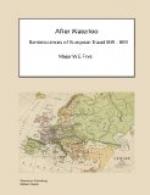Then again in the war of American Independence (and here my countrymen must excuse me if I point out the acts of injustice committed by them, when acting in obedience to an unprincipled and arbitrary government and in a cause hostile to freedom), who does not recollect the private property wantonly destroyed and confiscated by the English? their employing the Indian tribes, those merciless savages of the forest, to scalp, etc., which called forth the indignation of a Chatham? and the grossly unjust pillage and confiscation of property which took place at St Eustatius by the commanders of a religious and gracious King?[34] Again, who does not recollect the gentle but deep reproof given by the American General Schuyler to the English General Burgoyne, when the latter was made prisoner by the Americans under Gates? General Schuyler’s valuable house, barns, etc., had been burned by the express order of Burgoyne. Nevertheless, Schuyler received him with dignified politeness, magnanimously stifled the recollection of the injury he had received, and obtained for him a good quarter, merely remarking, “General, had my house and farms not been burned, I could have offered you a more comfortable abode.” How Burgoyne must have felt this reproof! yet he was not by nature a harsh man, but he had the orders of his government to exercise severities; he was educated in Tory principles, and passive obedience is their motto.
Can one forget likewise even, in the late war, Nelson’s conduct to Caraccioli at Naples, whom he caused to be hanged on board of an English ship of war, together with a number of other patriots, in violation of a solemn capitulation, by which it had been stipulated that they should be considered as prisoners of war and sent to France? Then again the wanton destruction of the Capitol and other public buildings at Washington not devoted to military purposes, which it is not usual to destroy or deface; and the valuable public library too which was burned? What excuse can be offered for this? Were the times of Omar returned? It is fair and allowed by the laws of war to blow up and destroy arsenals, magazines, containing warlike stores and engines of destruction, but to destroy with Gothic barbarity buildings of great symmetry and beauty, and a library too—O fie!




